小学英语形容词的比较级
完整小学英语比较级和最高级
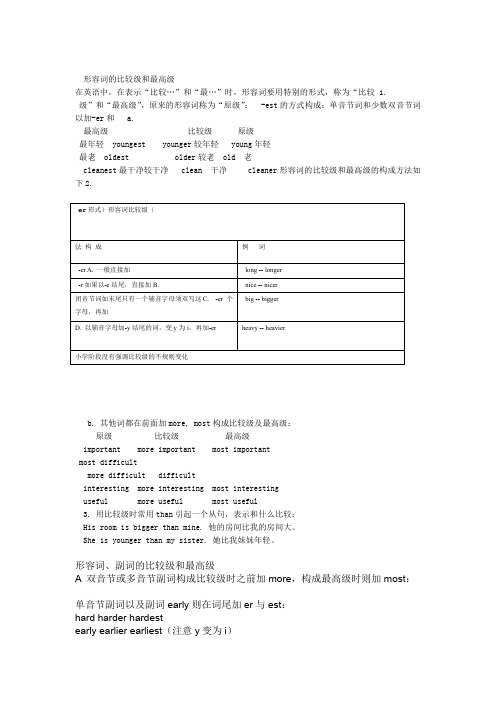
形容词的比较级和最高级在英语中,在表示“比较…”和“最…”时,形容词要用特别的形式,称为“比较 1.级”和“最高级”,原来的形容词称为“原级”: -est的方式构成:单音节词和少数双音节词以加-er和 a.最高级比较级原级最年轻 youngest younger较年轻 young年轻最老 oldest older较老 old 老cleanest最干净较干净 clean 干净 cleaner形容词的比较级和最高级的构成方法如下2.b. 其他词都在前面加more, most构成比较级及最高级:原级比较级最高级important more important most importantmost difficultmore difficult difficultinteresting more interesting most interestinguseful more useful most useful3. 用比较级时常用than引起一个从句,表示和什么比较:His room is bigger than mine. 他的房间比我的房间大。
She is younger than my sister. 她比我妹妹年轻。
形容词、副词的比较级和最高级A 双音节或多音节副词构成比较级时之前加more,构成最高级时则加most:单音节副词以及副词early则在词尾加er与est:hard harder hardestearly earlier earliest(注意y变为i)B 不规则变化:well better bestbadly worse worstlittle less leastmuch more mostfar farther farthest(仅用于指距离)further furthest.much,more,mostA more和most的用法相当自由:You should ride more.你必须多骑马。
11:语法专练十一:小学形容词的比较级和最高级
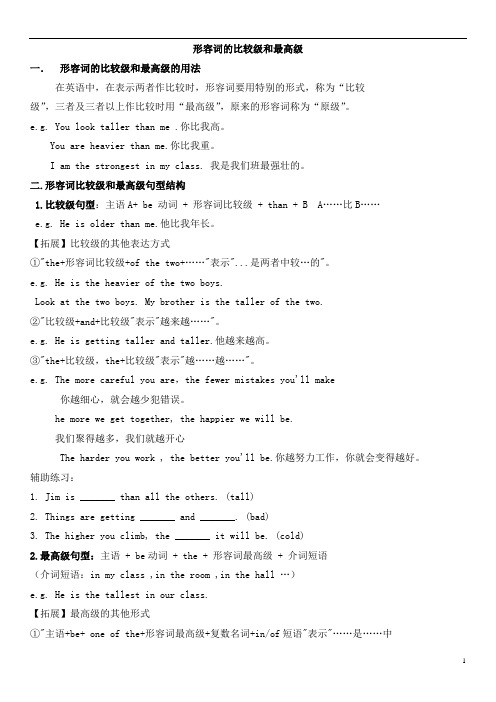
形容词的比较级和最高级一.形容词的比较级和最高级的用法在英语中,在表示两者作比较时,形容词要用特别的形式,称为“比较级”,三者及三者以上作比较时用“最高级”,原来的形容词称为“原级”。
e.g. You look taller than me .你比我高。
You are heavier than me.你比我重。
I am the strongest in my class. 我是我们班最强壮的。
二.形容词比较级和最高级句型结构1.比较级句型:主语A+ be 动词 + 形容词比较级 + than + B A……比B……e.g. He is older than me.他比我年长。
【拓展】比较级的其他表达方式①"the+形容词比较级+of the two+……"表示"...是两者中较…的"。
e.g. He is the heavier of the two boys.Look at the two boys. My brother is the taller of the two.②"比较级+and+比较级"表示"越来越……"。
e.g. He is getting taller and taller.他越来越高。
③"the+比较级,the+比较级"表示"越……越……"。
e.g. The more careful you are,the fewer mistakes you'll make你越细心,就会越少犯错误。
he more we get together, the happier we will be.我们聚得越多,我们就越开心The harder you work , the better you'll be.你越努力工作,你就会变得越好。
辅助练习:1. Jim is _______ than all the others. (tall)2. Things are getting _______ and _______. (bad)3. The higher you climb, the _______ it will be. (cold)2.最高级句型:主语 + be动词 + the + 形容词最高级 + 介词短语(介词短语:in my class ,in the room ,in the hall …)e.g. He is the tallest in our class.【拓展】最高级的其他形式①"主语+be+ one of the+形容词最高级+复数名词+in/of短语"表示"……是……中最……之一"e.g. Beijing is one of the largest cities in China.②序数词+最高级e.g. Hainan Island is the second largest island in China.辅助练习:1.The changjiang river is ____________________ (long) river in China.2. The Yellow River (Huang He) is ________________ (第二长)river in China3.A.形容词的比较级和最高级变化规则B. 部分双音节与多音节的词比较级在原级之前加more, 最高级在原级之前加most beautiful---more beautiful---most beautifulinteresting--- more interesting –most interestingdifficult--- more difficult – most difficultC.不规则变化的形容词:little / few - less – least good – better - bestbad/ill - worse – worst far -- farther/further—farthest/furthestmany/much – more – moste.g. 比较一下下列句子,领悟原级、比较级、最高级的用法。
小学英语比较级
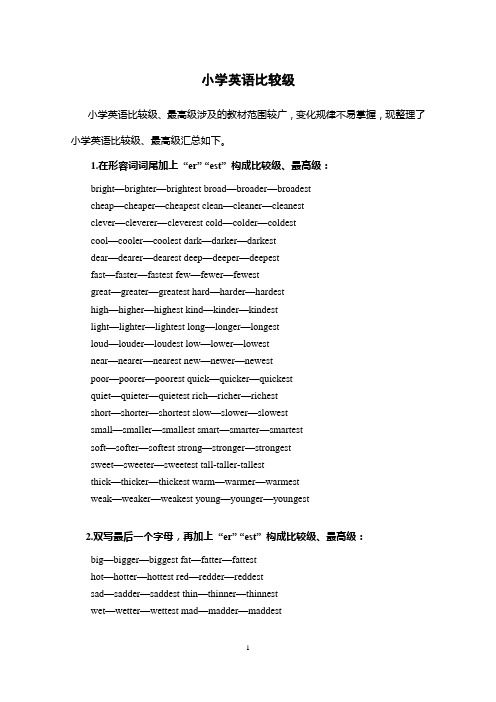
小学英语比较级小学英语比较级、最高级涉及的教材范围较广,变化规律不易掌握,现整理了小学英语比较级、最高级汇总如下。
1.在形容词词尾加上“er” “est” 构成比较级、最高级:bright—brighter—brightest broad—broader—broadestcheap—cheaper—cheapest clean—cleaner—cleanestclever—cleverer—cleverest cold—colder—coldestcool—cooler—coolest dark—darker—darkestdear—dearer—dearest deep—deeper—deepestfast—faster—fastest few—fewer—fewestgreat—greater—greatest hard—harder—hardesthigh—higher—highest kind—kinder—kindestlight—lighter—lightest long—longer—longestloud—louder—loudest low—lower—lowestnear—nearer—nearest new—newer—newestpoor—poorer—poorest quick—quicker—quickestquiet—quieter—quietest rich—richer—richestshort—shorter—shortest slow—slower—slowestsmall—smaller—smallest smart—smarter—smartestsoft—softer—softest strong—stronger—strongestsweet—sweeter—sweetest tall-taller-tallestthick—thicker—thickest warm—warmer—warmestweak—weaker—weakest young—younger—youngest2.双写最后一个字母,再加上“er” “est” 构成比较级、最高级:big—bigger—biggest fat—fatter—fattesthot—hotter—hottest red—redder—reddestsad—sadder—saddest thin—thinner—thinnestwet—wetter—wettest mad—madder—maddest3.以不发音的字母e结尾的形容词,加上“r” “st” 构成比较级、最高级:able—abler—ablest brave—braver—bravestclose—closer—closest fine—finer—finestlarge—larger—largest late—later—latestnice—nicer—nicest ripe—riper—ripestrude—ruder—rudest safe—safer—safeststrange—stranger—strangest wide—wider—widestwise—wiser—wisest white—whiter—whitest4.以字母y结尾的形容词,把y改为i,再加上“er” “est” 构成比较级、最高级:busy—busier—busiest dirty—dirtier—dirtiestdry—drier—driest early—earlier—earliesteasy—easier—easiest friendly—friendlier—friendliestfunny—funnier—funniest happy—happier—happiesthealthy—healthier—healthiest heavy—heavier—heaviesthungry—hungrier—hungriest lazy—lazier—laziestlucky—luckier—luckiest naughty—naughtier—naughtiestnoisy—noisier—noisiest pretty—prettier—prettiestsilly—sillier—silliest spicy—spicier—spiciestthirsty—thirstier—thirstiest ugly—uglier—ugliest5.双音节、多音节形容词,在单词前面加上“more” “most” 构成比较级、最高级:afraid—more afraid—most afraidbeautiful—more beautiful—most beautifulcareful—more careful—most carefulcheerful—more cheerful—most cheerfulcrowded—more crowded—most crowdeddangerous—more dangerous—most dangerousdelicious—more delicious—most delicious difficult—more difficult—most difficult exciting—more exciting—most exciting expensive—more expensive—most expensive famous—more famous—most famous frightened—more frightened—most frightened frightening—more frightening—most frightening hard-working—more hard-working—most hard-working helpful—more helpful—most helpful honest—more honest—most honest important—more important—most important interesting—more interesting—most interesting polite—more polite—most politeterrible—more terrible—most terribletired—more tired—most tired6.不规则变化的形容词:bad—worse—worstfar—farther—farthestgood—better—bestill—worse—worstlittle—less—leastmany—more—mostmuch—more—mostold—older—oldestwell—better—best。
小学英语语法形容词的原级,比较级和最高级的用法
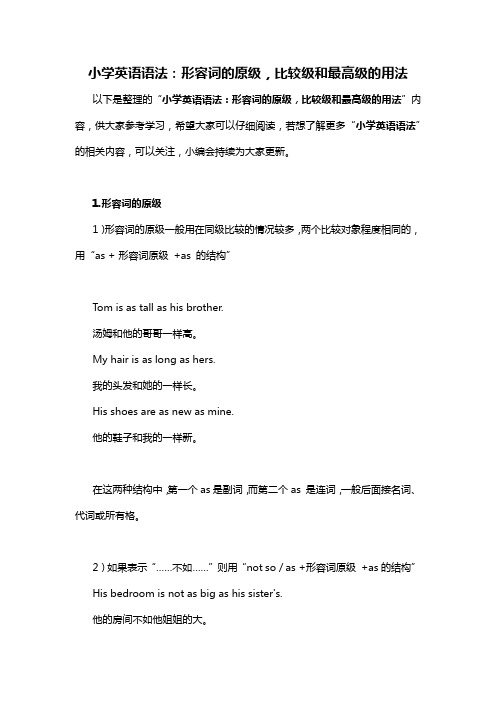
小学英语语法:形容词的原级,比较级和最高级的用法以下是整理的“小学英语语法:形容词的原级,比较级和最高级的用法”内容,供大家参考学习,希望大家可以仔细阅读,若想了解更多“小学英语语法”的相关内容,可以关注,小编会持续为大家更新。
1.形容词的原级1)形容词的原级一般用在同级比较的情况较多,两个比较对象程度相同的,用“as + 形容词原级+as 的结构”Tom is as tall as his brother.汤姆和他的哥哥一样高。
My hair is as long as hers.我的头发和她的一样长。
His shoes are as new as mine.他的鞋子和我的一样新。
在这两种结构中,第一个as是副词,而第二个as 是连词,一般后面接名词、代词或所有格。
2)如果表示“……不如……”则用“not so / as +形容词原级+as的结构”His bedroom is not as big as his sister's.他的房间不如他姐姐的大。
It is not so cold as yesterday.今天不像昨天那么冷。
2. 形容词的比较级,两者比较时用形容词比较级。
1)其基本结构为“……比较级+than……”He is taller than me.他比我高。
The girl is more beautiful than before.这个女孩比以前更加漂亮了。
但我们在使用时可以加一些前置修饰词:I feel much better today. 我今天感觉好多了。
He is fat, but his brother is still fatter.他很胖,不过他哥哥更胖。
2)在两者之间选择“哪一个更……”时,用句型“Which/Who is+比较级,…or…”Which dress is cheaper, the red one or the yellow one?哪一条裙子更便宜?红的还是黄的?3)表示“两者之间较……的一个”时,用“the+比较级”Ktty is the taller of the twins.双胞胎中凯蒂比较高。
四形容词和副词的比较级最高级

四、形容词和副词的比较级、最高级(Comparison of Adjectives and Adverbs)I. 形容词比较级和最高级的形式一、形容词比较级和最高级的构成⑥合成形容词的比较等级•大多数在前面加more及most。
例如:home-sick, more home-sick, most home-sickup-to-date, more up-to-date, most up-to-date•若第一个词是大家熟悉的单音节词,则-er及-est都加在这个词的前面。
例:Long-lasting, longer-lasting, longest-lastinghard-working, harder-working, hardest-workingKind-hearted, kinder-hearted, kindest-heartedWell-known, better-known, best-known二、不规则形容词的比较级和最高级形式II.副词比较级和最高级的形式副词比较级和最高级的变化形式与形容词基本上一样。
一、一般副词hard→harder →hardest fast→faster →fastestlate→later →latest early→earlier →earliest二、特殊副词well →better →best much →more →mostbadly →worse →worst little →less →least三、开放类副词开放类副词即以后缀-ly结尾的副词不能像形容词那样加-er或-est,而应在副词原形前加more或most。
如:quickly →more quickly →most quickly quietly →more quietly →most qui etlyIII.形容词与副词比较级和最高级的基本用法一、比较级1.比较级通常由“形容词(副词)比较级+than+…”构成,表示在两者中间一方比另一方“更加……”。
(完整版)小学英语形容词的比较级
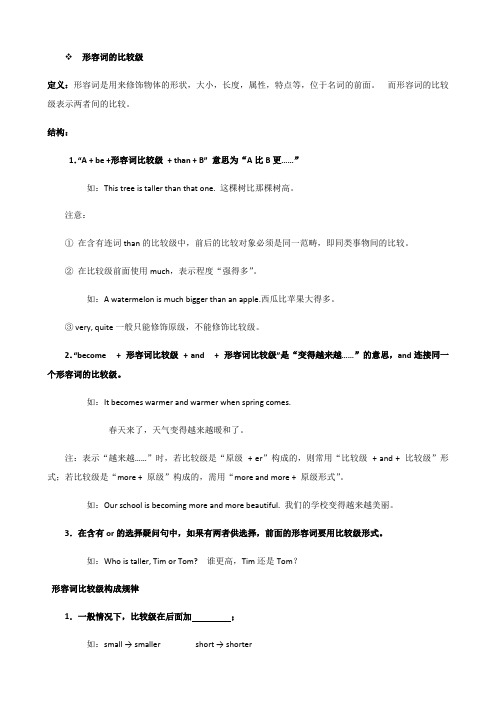
形容词的比较级定义:形容词是用来修饰物体的形状,大小,长度,属性,特点等,位于名词的前面。
而形容词的比较级表示两者间的比较。
结构:1.“A + be +形容词比较级+ than + B” 意思为“A比B更……”如:This tree is taller than that one. 这棵树比那棵树高。
注意:①在含有连词than的比较级中,前后的比较对象必须是同一范畴,即同类事物间的比较。
②在比较级前面使用much,表示程度“强得多”。
如:A watermelon is much bigger than an apple.西瓜比苹果大得多。
③ very, quite一般只能修饰原级,不能修饰比较级。
2.“become + 形容词比较级+ and + 形容词比较级”是“变得越来越……”的意思,and连接同一个形容词的比较级。
如:It becomes warmer and warmer when spring comes.春天来了,天气变得越来越暖和了。
注:表示“越来越……”时,若比较级是“原级+ er”构成的,则常用“比较级+ and + 比较级”形式;若比较级是“more + 原级”构成的,需用“more and more + 原级形式”。
如:Our school is becoming more and more beautiful. 我们的学校变得越来越美丽。
3.在含有or的选择疑问句中,如果有两者供选择,前面的形容词要用比较级形式。
如:Who is taller, Tim or Tom? 谁更高,Tim还是Tom?形容词比较级构成规律1.一般情况下,比较级在后面加;如:small → smaller short → shorter2.在重读闭音节(即:辅音+元音+辅音)中,先双写末尾的辅音字母,比较级加-er,如:big →bigger hot →hotter3.以不发音e结尾的单音节词,比较在原级后加;如:large →larger nice →nicer4.以“辅音字母+y”结尾的双音节词,,比较级加;如:easy →easier heavy →heavier5.多数多音节词,比较级在前面加;如:beautiful → more beautiful different → more different6.有少数形容词的比较级是不规则的,必须熟记。
形容词副词的比较级和最高级

3. ---Have you decided which you’d like to buy, the black shirt or the yellow one? ---The black one. Because it is _______ of the two.
The green oranges are big. The orange ones are bigger. The red ones are the biggest of all.
250,000 RMB.
500 RMB 50,000 RMB.
The bike is expensive. The red cat is more expensive than the bike. The green car is the most expensive.
better the chicken 7. Which do you think tastes________, or the fish? (good)
8. Who runs faster _____, Tom or Jim? (fast)
1. The environment in our hometown is _____ than it was before. • good B. worse C. better D. bad
5. Alice writes well. Mary writes _________________
1. ---Who’s ______ basketball player in China now? Is it Yao Ming? ---No. It’s Sun Mingming. A. tall B. taller C. the tallest 2. English is one of ______ imporant subjects in our school. A. most B. the most C. more D. much more
常用形容词及比较级
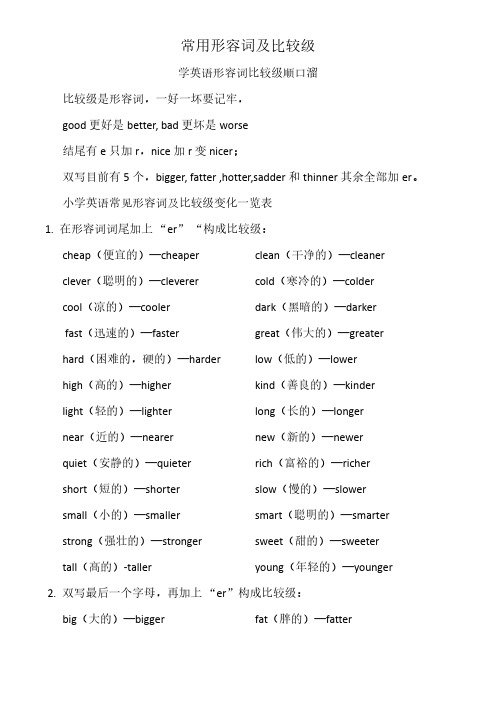
学英语形容词比较级顺口溜比较级是形容词,一好一坏要记牢,good更好是better,bad更坏是worse结尾有e只加r,nice加r变nicer;双写目前有5个,bigger,fatter,hotter,sadder和thinner其余全部加er。
小学英语常见形容词及比较级变化一览表1.在形容词词尾加上“er”“构成比较级:cheap(便宜的)—cheaper clean(干净的)—cleanerclever(聪明的)—cleverer cold(寒冷的)—coldercool(凉的)—cooler dark(黑暗的)—darkerfast(迅速的)—faster great(伟大的)—greaterhard(困难的,硬的)—harder low(低的)—lowerhigh(高的)—higher kind(善良的)—kinderlight(轻的)—lighter long(长的)—longernear(近的)—nearer new(新的)—newerquiet(安静的)—quieter rich(富裕的)—richershort(短的)—shorter slow(慢的)—slowersmall(小的)—smaller smart(聪明的)—smarterstrong(强壮的)—stronger sweet(甜的)—sweetertall(高的)-taller young(年轻的)—younger2.双写最后一个字母,再加上“er”构成比较级:big(大的)—bigger fat(胖的)—fatterhot(热的)—hotter sad(伤心的)—sadderthin(瘦的)—thinner3.以不发音的字母e结尾的形容词,加上“r”构成比较级:close(接近的)—closer fine(好的,完美的)—finer large(巨大的)—larger late(迟的)—laternice(好的)—nicer white(白的)—whiter4.以字母y结尾的形容词,把y改为i,再加上“er”构成比较级:busy(忙碌的)—busier dirty(脏的)—dirtierearly(早的)—earlier easy(容易的)—easierfriendly(友好的)—friendlier pretty(美丽的)—prettier funny(好玩的)—funnier happy(开心的)—happier healthy(健康的)—healthier heavy(重的)—heavierhungry(饿的)—hungrier lazy(懒惰的)—lazierlucky(幸运的)—luckier noisy(嘈杂的)—noisier 5.双音节、多音节形容词,在单词前面加上“more”构成比较级:afraid(害怕的)—more afraidbeautiful(美丽的)—more beautifulcareful(仔细的)—more carefuldelicious(美味的)—more deliciousexciting(令人兴奋的)—more excitingexpensive(昂贵的)—more expensivefamous(著名的)—more famoushard-working(勤奋的)—more hard-workinghelpful(有帮助的)—more helpfulinteresting(有趣的)—more interestingpolite(有礼貌的)—more politetired(累的)—more tired6.不规则变化的形容词:bad(坏的)—worse far(远的)—farthergood(好的)—better ill(病的)—worselittle(少的)—less many(多的)—moremuch(多的)—more well(好的,身体好的)—better old(年老的)—older(elder)。
小学六年级英语语法专项训练-比较级.doc
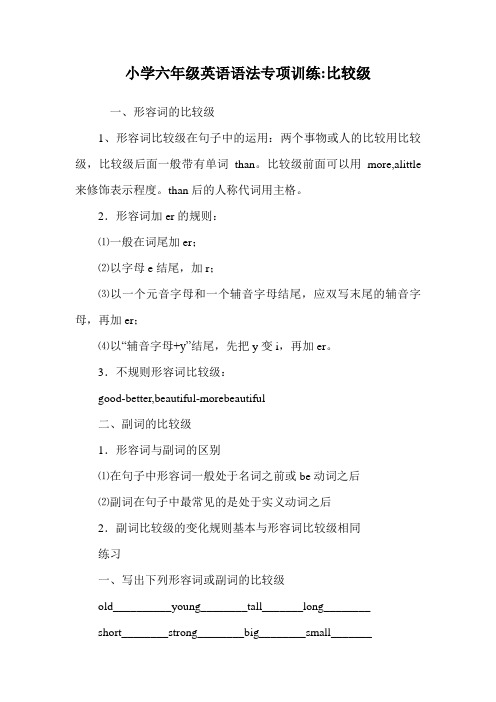
小学六年级英语语法专项训练:比较级一、形容词的比较级1、形容词比较级在句子中的运用:两个事物或人的比较用比较级,比较级后面一般带有单词than。
比较级前面可以用more,alittle 来修饰表示程度。
than后的人称代词用主格。
2.形容词加er的规则:⑴一般在词尾加er;⑵以字母e结尾,加r;⑶以一个元音字母和一个辅音字母结尾,应双写末尾的辅音字母,再加er;⑷以“辅音字母+y”结尾,先把y变i,再加er。
3.不规则形容词比较级:good-better,beautiful-morebeautiful二、副词的比较级1.形容词与副词的区别⑴在句子中形容词一般处于名词之前或be动词之后⑵副词在句子中最常见的是处于实义动词之后2.副词比较级的变化规则基本与形容词比较级相同练习一、写出下列形容词或副词的比较级old__________young________tall_______long________short________strong________big________small_______fat_________thin__________heavy______light________ nice_________good_________beautiful__________________ low__________high_________slow_______fast________ late__________early_________far_________well_______二、根据句意填入单词的正确形式:1.Mybrotheristwoyears__________thanme.2.Tomisas________asJim.3.Isyoursister__________thanyou?Yes,sheis.4.Whois___________,youorHelen?Helenis.5.Whosepencil-boxis__________,yoursorhers?Hersis.6.Mary’shairisas__________asLucy’s.7.Ben______________thansomeoftheboysinhisclass.8.________Nancysing__________thanHelen?Yes,she_____.9.Fangfangisnotas_________astheothergirls.10.Myeyesare__________than________..11.Whichis___________,theelephantorthepig?12.Whogetsup_________,TimorTom?13._____thegirlsgetup_______thantheboys?No,they______.14.Jimruns_____.ButBenruns_____.15.Thechilddoesn’t______as____asthestudents.三、翻译句子:1、谁比Jim年纪大?是你。
规则形容词的比较级和最高级变化规则
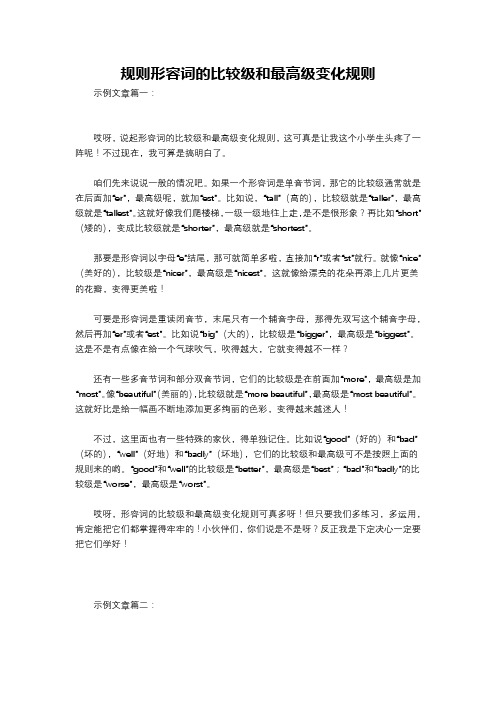
规则形容词的比较级和最高级变化规则示例文章篇一:哎呀,说起形容词的比较级和最高级变化规则,这可真是让我这个小学生头疼了一阵呢!不过现在,我可算是搞明白了。
咱们先来说说一般的情况吧。
如果一个形容词是单音节词,那它的比较级通常就是在后面加“er”,最高级呢,就加“est”。
比如说,“tall”(高的),比较级就是“taller”,最高级就是“tallest”。
这就好像我们爬楼梯,一级一级地往上走,是不是很形象?再比如“short”(矮的),变成比较级就是“shorter”,最高级就是“shortest”。
那要是形容词以字母“e”结尾,那可就简单多啦,直接加“r”或者“st”就行。
就像“nice”(美好的),比较级是“nicer”,最高级是“nicest”。
这就像给漂亮的花朵再添上几片更美的花瓣,变得更美啦!可要是形容词是重读闭音节,末尾只有一个辅音字母,那得先双写这个辅音字母,然后再加“er”或者“est”。
比如说“big”(大的),比较级是“bigger”,最高级是“biggest”。
这是不是有点像在给一个气球吹气,吹得越大,它就变得越不一样?还有一些多音节词和部分双音节词,它们的比较级是在前面加“more”,最高级是加“most”。
像“beautiful”(美丽的),比较级就是“more beautiful”,最高级是“most beautiful”。
这就好比是给一幅画不断地添加更多绚丽的色彩,变得越来越迷人!不过,这里面也有一些特殊的家伙,得单独记住。
比如说“good”(好的)和“bad”(坏的),“well”(好地)和“badly”(坏地),它们的比较级和最高级可不是按照上面的规则来的哟。
“good”和“well”的比较级是“better”,最高级是“best”;“bad”和“badly”的比较级是“worse”,最高级是“worst”。
哎呀,形容词的比较级和最高级变化规则可真多呀!但只要我们多练习,多运用,肯定能把它们都掌握得牢牢的!小伙伴们,你们说是不是呀?反正我是下定决心一定要把它们学好!示例文章篇二:哎呀呀,同学们,今天咱们来聊聊形容词的比较级和最高级的变化规则,这可有意思啦!比如说,一般情况下,咱们直接在形容词后面加“er”就变成比较级,加“est”就变成最高级。
小学英语形容词的比较级
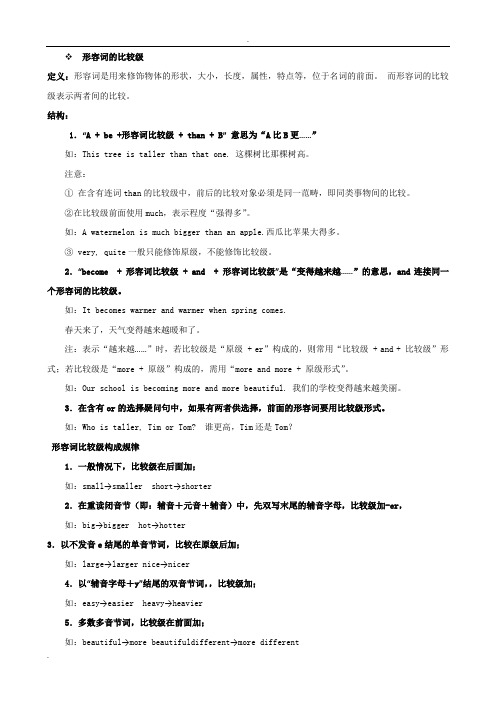
形容词的比较级定义:形容词是用来修饰物体的形状,大小,长度,属性,特点等,位于名词的前面。
而形容词的比较级表示两者间的比较。
结构:1.“A + be +形容词比较级 + than + B”意思为“A比B更……”如:This tree is taller than that one. 这棵树比那棵树高。
注意:①在含有连词than的比较级中,前后的比较对象必须是同一范畴,即同类事物间的比较。
②在比较级前面使用much,表示程度“强得多”。
如:A watermelon is much bigger than an apple.西瓜比苹果大得多。
③ very, quite一般只能修饰原级,不能修饰比较级。
2.“become + 形容词比较级 + and + 形容词比较级”是“变得越来越……”的意思,and连接同一个形容词的比较级。
如:It becomes warmer and warmer when spring comes.春天来了,天气变得越来越暖和了。
注:表示“越来越……”时,若比较级是“原级 + er”构成的,则常用“比较级 + and + 比较级”形式;若比较级是“more + 原级”构成的,需用“more and more + 原级形式”。
如:Our school is becoming more and more beautiful. 我们的学校变得越来越美丽。
3.在含有or的选择疑问句中,如果有两者供选择,前面的形容词要用比较级形式。
如:Who is taller, Tim or Tom? 谁更高,Tim还是Tom?形容词比较级构成规律1.一般情况下,比较级在后面加;如:small→smaller short→shorter2.在重读闭音节(即:辅音+元音+辅音)中,先双写末尾的辅音字母,比较级加-er,如:big→bigger hot→hotter3.以不发音e结尾的单音节词,比较在原级后加;如:large→larger nice→nicer4.以“辅音字母+y”结尾的双音节词,,比较级加;如:easy→easier heavy→heavier5.多数多音节词,比较级在前面加;如:beautiful→more beautifuldifferent→more different6.有少数形容词的比较级是不规则的,必须熟记。
形容词的比较级与最高级变化规则
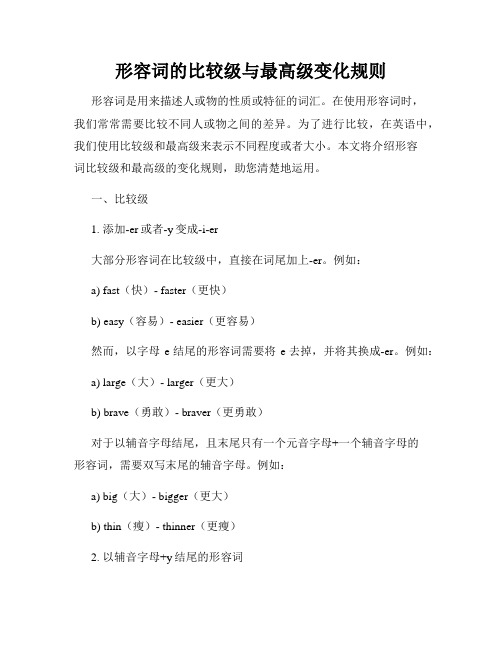
形容词的比较级与最高级变化规则形容词是用来描述人或物的性质或特征的词汇。
在使用形容词时,我们常常需要比较不同人或物之间的差异。
为了进行比较,在英语中,我们使用比较级和最高级来表示不同程度或者大小。
本文将介绍形容词比较级和最高级的变化规则,助您清楚地运用。
一、比较级1. 添加-er或者-y变成-i-er大部分形容词在比较级中,直接在词尾加上-er。
例如:a) fast(快)- faster(更快)b) easy(容易)- easier(更容易)然而,以字母e结尾的形容词需要将e去掉,并将其换成-er。
例如:a) large(大)- larger(更大)b) brave(勇敢)- braver(更勇敢)对于以辅音字母结尾,且末尾只有一个元音字母+一个辅音字母的形容词,需要双写末尾的辅音字母。
例如:a) big(大)- bigger(更大)b) thin(瘦)- thinner(更瘦)2. 以辅音字母+y结尾的形容词对于以辅音字母+y结尾的形容词,在比较级中,需要将y变成i,然后再加上-er。
例如:a) happy(开心)- happier(更开心)b) funny(有趣)- funnier(更有趣)3. 不规则变化有一些常用形容词的比较级有不规则的变化规则,需要特别记住。
例如:a) good(好)- better(更好)b) bad(坏)- worse(更坏)c) far(远)- further(更远)二、最高级1. 一般规则在最高级中,大部分形容词在词尾加上-est。
例如:a) small(小)- smallest(最小)b) tall(高)- tallest(最高)如果形容词以字母e结尾,只需在词尾加上-st。
例如:a) large(大)- largest(最大)b) wise(聪明)- wisest(最聪明)2. 以辅音字母+y结尾的形容词同样地,对于以辅音字母+y结尾的形容词,在最高级中,需要将y变成i,然后再加上-est。
(完整版)小学英语比较级

一、形容词、副词的比较级和最高级的构成规则1.大多数单词的变法small→smaller→smallest short→shorter→shortest great→greater→greatest clever→clevere r→cleverest narrow→narrower→narrowest tall→taller→tallest2.以不发音e结尾的单音节词,比较在原级后加-r,最高级在原级后加-st;large→larger→largest nice→nicer→nicest3.先双写末尾的辅音字母,比较级加-er,最高级加-est;big→bigger→biggest hot→hotter→hottest fat→fatter→fattest thin-thinner-thinnest sad-sadder--sa ddest 4.以“辅音字母+y”结尾的双音节词,把y改为i,比较级加-er,最高级加-est;easy→easier→easiest heavy→heavier→heaviest busy→busier→busiesthappy→happier→happiest5.其他双音节词和多音节词,比较级在前面加more,最高级在前面加most;beautiful→more beautiful→most beautifuldifferent→more different→most different注意:(1)形容词最高级前通常必须用定冠词 the,副词最高级前可不用。
6.有少数形容词、副词的比较级和最高级是不规则的,必须熟记。
good-----better------best好的well------better------best身体好的bad------worse------worst坏的ill--------worse-------worst病的many--------more------most许多 much------more--------most许多few------less-------least少数几个little-------less------least少数一点far------further------furthest更进一步,程度far------farther------farthest更远,路程old-------older------oldest年老的(指年纪)old------elder-------eldest年老的(指兄弟姐妹的排行)二、形容词、副词的比较级和最高级的用法1.“A + be +形容词比较级 + than + B”意思为“A比B更……”。
小学英语语法详解形容词--形容词的原级,比较级和最高级的用法
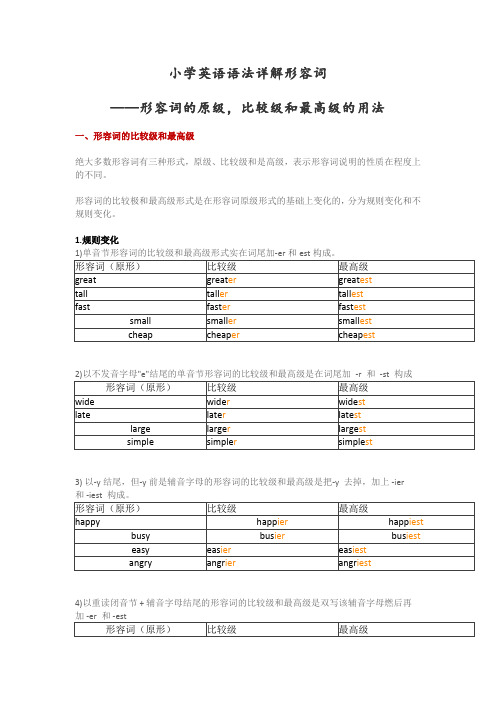
小学英语语法详解形容词——形容词的原级,比较级和最高级的用法一、形容词的比较级和最高级绝大多数形容词有三种形式,原级、比较级和是高级,表示形容词说明的性质在程度上的不同。
形容词的比较极和最高级形式是在形容词原级形式的基础上变化的,分为规则变化和不规则变化。
1.规则变化3) 以-y结尾,但-y前是辅音字母的形容词的比较级和最高级是把-y 去掉,加上 -ier4)以重读闭音节 + 辅音字母结尾的形容词的比较级和最高级是双写该辅音字母燃后再5)双音节和多音节形容词的比较级和最高级需用more和the most 加在形容词前面来Aaron老师的小提醒:★有些形容词的比较级和最高级,可以有两种表示法:clever—cleverer, cleverest 或者more clever, the most cleverfriendly—friendlier,friendliest 或者more friendly , the most friendly★形容词前如加less和least 则表示"较不"和"最不":important 重要,less important 较不重要,least important 最不重要。
二、形容词的原级,比较级和最高级的用法1.形容词的原级1)形容词的原级一般用在同级比较的情况较多,两个比较对象程度相同的,用“as + 形容词原级+as 的结构”Tom is as tall as his brothe.汤姆和他的哥哥一样高。
My hair is as long as hers.我的头发和她的一样长。
His shoes are as new as mine.他的鞋子和我的一样新。
在这两种结构中,第一个as是副词,而第二个as 是连词,一般后面接名词、代词或所有格。
2)如果表示“……不如……”则用“not so / as +形容词原级+as的结构”His bedroom is not as big as his sister's.他的房间不如他姐姐的大。
小学形容词比较级和最高级(共5篇)
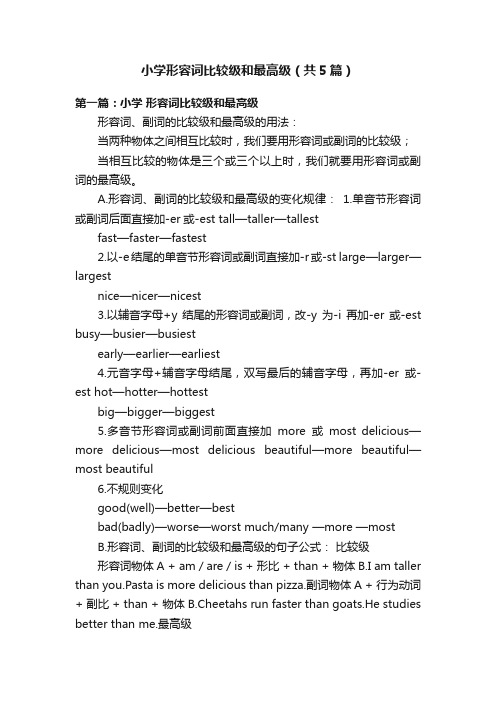
小学形容词比较级和最高级(共5篇)第一篇:小学形容词比较级和最高级形容词、副词的比较级和最高级的用法:当两种物体之间相互比较时,我们要用形容词或副词的比较级;当相互比较的物体是三个或三个以上时,我们就要用形容词或副词的最高级。
A.形容词、副词的比较级和最高级的变化规律:1.单音节形容词或副词后面直接加-er或-est tall—taller—tallestfast—faster—fastest2.以-e结尾的单音节形容词或副词直接加-r或-st large—larger—largestnice—nicer—nicest3.以辅音字母+y结尾的形容词或副词,改-y为-i再加-er或-est busy—busier—busiestearly—earlier—earliest4.元音字母+辅音字母结尾,双写最后的辅音字母,再加-er或-est hot—hotter—hottestbig—bigger—biggest5.多音节形容词或副词前面直接加more或most delicious—more delicious—most delicious beautiful—more beautiful—most beautiful6.不规则变化good(well)—better—bestbad(badly)—worse—worst much/many —more —mostB.形容词、副词的比较级和最高级的句子公式:比较级形容词物体A + am / are / is + 形比 + than + 物体B.I am taller than you.Pasta is more delicious than pizza.副词物体A + 行为动词+ 副比 + than + 物体B.Cheetahs run faster than goats.He studies better than me.最高级1)物体A + am / are / is + the + 形最高级 + 比较范围(of + 人/物,in +地方).I am the tallest in the class.Pasta is the most delicious food of the three.2)物体A + 行为动词 + 副词最高级 + 比较范围(of + 人/物,in + 地方).Cheetahs run fastest in the world.He studies best of us.一.词形变换。
比较级最高级

小学英语比较级、最高级汇总1.在形容词词尾加上“er” “est” 构成比较级、最高级:bright(明亮的)—brighter—brightest broad(广阔的)—broader—broadestcheap(便宜的)—cheaper—cheapest clean(干净的)—cleaner—cleanestclever(聪明的)—cleverer—cleverest cold(寒冷的)—colder—coldestcool(凉的)—cooler—coolest dark(黑暗的)—darker—darkestdear(贵的)—dearer—dearest deep(深的)—deeper—deepestfast(迅速的)—faster—fastest few(少的)—fewer—fewestgreat(伟大的)—greater—greatest hard(困难的,硬的)—harder—hardesthigh(高的)—higher—highest kind(善良的)—kinder—kindestlight(轻的)—lighter—lightest long(长的)—longer—longestloud(响亮的)—louder—loudest low(低的)—lower—lowestnear(近的)—nearer—nearest new(新的)—newer—newestpoor(穷的)—poorer—poorest quick(快的)—quicker—quickestquiet(安静的)—quieter—quietest rich(富裕的)—richer—richestshort(短的)—shorter—shortest slow(慢的)—slower—slowestsmall(小的)—smaller—smallest smart(聪明的)—smarter—smartestsoft(柔软的)—softer—softest strong(强壮的)—stronger—strongestsweet(甜的)—sweeter—sweetest tall(高的)-taller-tallestthick(厚的)—thicker—thickest warm(温暖的)—warmer—warmestweak(弱的)—weaker—weakest young(年轻的)—younger—youngest2.双写最后一个字母,再加上“er” “est” 构成比较级、最高级:big(大的)—bigger—biggest fat(胖的)—fatter—fattesthot(热的)—hotter—hottest red(红的)—redder—reddestsad(伤心的)—sadder—saddest thin(瘦的)—thinner—thinnestwet(湿的)—wetter—wettest mad(疯的)—madder—maddest3.以不发音的字母e结尾的形容词,加上“r” “st” 构成比较级、最高级:able(能干的)—abler—ablest brave(勇敢的)—braver—bravestclose(接近的)—closer—closest fine(好的,完美的)—finer—finestlarge(巨大的)—larger—largest late(迟的)—later—latestnice(好的)—nicer—nicest ripe(成熟的)—riper—ripestrude(粗鲁的)—ruder—rudest safe(安全的)—safer—safeststrange(奇怪的)—stranger—strangest wide(宽广的)—wider—widestwise(睿智的,聪明的)—wiser—wisest white(白的)—whiter—whitest4.以字母y结尾的形容词,把y改为i,再加上“er” “est” 构成比较级、最高级:busy(忙碌的)—busier—busiest dirty(脏的)—dirtier—dirtiestdry(干燥的)—drier—driest early(早的)—earlier—earliesteasy(容易的)—easier—easiest friendly(友好的)—friendlier—friendliestfunny(好玩的)—funnier—funniest happy(开心的)—happier—happiesthealthy(健康的)—healthier—healthiest heavy(重的)—heavier—heaviesthungry(饿的)—hungrier—hungriest lazy(懒惰的)—lazier—laziestlucky(幸运的)—luckier—luckiest naughty(调皮的)—naughtier—naughtiestnoisy(嘈杂的)—noisier—noisiest pretty(美丽的)—prettier—prettiestsilly(傻的)—sillier—silliest spicy(辣的)—spicier—spiciestthirsty(渴的)—thirstier—thirstiest ugly(丑的)—uglier—ugliest5.双音节、多音节形容词,在单词前面加上“more” “most” 构成比较级、最高级:afraid(害怕的)—more afraid—most afraidbeautiful(美丽的)—more beautiful—most beautifulcareful(仔细的)—more careful—most carefulcheerful(开心的)—more cheerful—most cheerfulcrowded(拥挤的)—more crowded—most crowdeddangerous(危险的)—more dangerous—most dangerousdelicious(美味的)—more delicious—most deliciousdifficult(困难的)—more difficult—most difficultexciting(令人兴奋的)—more exciting—most excitingexpensive(昂贵的)—more expensive—most expensivefamous(著名的)—more famous—most famousfrightened(受惊的)—more frightened—most frightenedfrightening(令人害怕的)—more frightening—most frighteninghard-working(勤奋的)—more hard-working—most hard-workinghelpful(有帮助的)—more helpful—most helpfulhonest(诚实的)—more honest—most honestimportant(重要的)—more important—most importantinteresting(有趣的)—more interesting—most interestingpolite(有礼貌的)—more polite—most politeterrible(可怕的)—more terrible—most terribletired(累的)—more tired—most tired6.不规则变化的形容词:bad(坏的)—worse—worst far(远的)—farther—farthest (far—further—furthest) good(好的)—better—best ill(病的)—worse—worstlittle(少的)—less—least many(多的)—more—most much(多的)—more—most old(年老的)—older—oldest ( old—elder—eldest)well(好的,身体好的)—better—best。
比较级的语法讲解
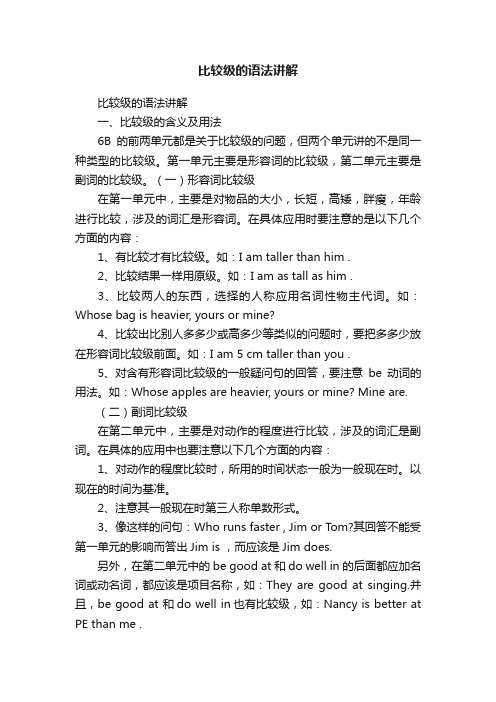
比较级的语法讲解比较级的语法讲解一、比较级的含义及用法6B的前两单元都是关于比较级的问题,但两个单元讲的不是同一种类型的比较级。
第一单元主要是形容词的比较级,第二单元主要是副词的比较级。
(一)形容词比较级在第一单元中,主要是对物品的大小,长短,高矮,胖瘦,年龄进行比较,涉及的词汇是形容词。
在具体应用时要注意的是以下几个方面的内容:1、有比较才有比较级。
如:I am taller than him .2、比较结果一样用原级。
如:I am as tall as him .3、比较两人的东西,选择的人称应用名词性物主代词。
如:Whose bag is heavier, yours or mine?4、比较出比别人多多少或高多少等类似的问题时,要把多多少放在形容词比较级前面。
如:I am 5 cm taller than you .5、对含有形容词比较级的一般疑问句的回答,要注意be动词的用法。
如:Whose apples are heavier, yours or mine? Mine are.(二)副词比较级在第二单元中,主要是对动作的程度进行比较,涉及的词汇是副词。
在具体的应用中也要注意以下几个方面的内容:1、对动作的程度比较时,所用的时间状态一般为一般现在时。
以现在的时间为基准。
2、注意其一般现在时第三人称单数形式。
3、像这样的问句:Who runs faster , Jim or Tom?其回答不能受第一单元的影响而答出Jim is ,而应该是Jim does.另外,在第二单元中的be good at 和do well in 的后面都应加名词或动名词,都应该是项目名称,如:They are good at singing.并且,be good at 和do well in也有比较级,如:Nancy is better at PE than me .二、比较级的构成形容词比较级和副词比较级的构成方法基本一致:1.、一般情况下,在单词的词尾直接加-er。
- 1、下载文档前请自行甄别文档内容的完整性,平台不提供额外的编辑、内容补充、找答案等附加服务。
- 2、"仅部分预览"的文档,不可在线预览部分如存在完整性等问题,可反馈申请退款(可完整预览的文档不适用该条件!)。
- 3、如文档侵犯您的权益,请联系客服反馈,我们会尽快为您处理(人工客服工作时间:9:00-18:30)。
❖形容词的比较级定义:形容词是用来修饰物体的形状,大小,长度,属性,特点等,位于名词的前面。
而形容词的比较级表示两者间的比较。
结构:1.“A + be +形容词比较级+ than + B” 意思为“A比B更……”如:This tree is taller than that one. 这棵树比那棵树高。
注意:① 在含有连词than的比较级中,前后的比较对象必须是同一范畴,即同类事物间的比较。
②在比较级前面使用much,表示程度“强得多”。
如:A watermelon is much bigger than an apple.西瓜比苹果大得多。
③ very, quite一般只能修饰原级,不能修饰比较级。
2.“become + 形容词比较级+ and + 形容词比较级”是“变得越来越……”的意思,and 连接同一个形容词的比较级。
如:It becomes warmer and warmer when spring comes.春天来了,天气变得越来越暖和了。
注:表示“越来越……”时,若比较级是“原级+ er”构成的,则常用“比较级+ and + 比较级”形式;若比较级是“more + 原级”构成的,需用“more and more + 原级形式”。
如:Our school is becoming more and more beautiful. 我们的学校变得越来越美丽。
3.在含有or的选择疑问句中,如果有两者供选择,前面的形容词要用比较级形式。
如:Who is taller, Tim or Tom? 谁更高,Tim还是Tom?形容词比较级构成规律1.一般情况下,比较级在后面加;如:small → smaller short → shorter2.在重读闭音节(即:辅音+元音+辅音)中,先双写末尾的辅音字母,比较级加-er,如:big →bigger hot→hotter3.以不发音e结尾的单音节词,比较在原级后加;如:large →larger nice →nicer4.以“辅音字母+y”结尾的双音节词,,比较级加;如:easy →easier heavy→heavier5.多数多音节词,比较级在前面加;如:beautiful → more beautiful different → more different 6.有少数形容词的比较级是不规则的,必须熟记。
如:good/well →_ bad→_ old→many/much→little→far →专项练习:一、写出下列形容词的比较级old__________ young________ tall_______ long________short________ strong________ big________ small_______fat_________ thin__________ heavy______ light________nice_________ good_________ beautiful__________________low__________ high_________ slow_______ fast________二、翻译句子:1、谁比Jim年纪大?是你。
________ is _________than Jim?________ are2、谁比David更强壮?是Gao Shan.________ _________ than David? Gao Shan ________.3、谁的铅笔更长,他的还是她的?我想是她的。
_________ pencil is _________,______or________?________is,I think.4、谁的苹果更重,你的姐姐的还是你的弟弟的?我的弟弟的。
_________ apples ________ ________,your _______ or your _______? My ____________ ___________.5、你和你的叔叔一样高吗?是的。
_________ ________as _________as your uncle?Yes,I am.6、他和他的朋友Jim一样年轻。
He _______ as __________ as ________ ________ Jim.7、她和她的双胞胎哥哥一样胖吗?不,她比他瘦。
________ ________ as _________ as______ twin _______?No, _________ _________ than him.8.Yang Ling每天睡得比SuYang晚。
Yang Ling ________ to _______ ________ than Su Yang every day.9.我跳得和Mike一样远。
I _________ as _______ as Mike.10.T om比你跑得快吗?不是的,他和我跑得一样快。
____ Tom _____ _____ than you?No,he _______. He_____ as_____ as_____.11.多做运动,你会更强壮。
________ more exercise,you’ll ________ _________ soon.12.我的科学很好,但是语文不好。
I ______ ________ at Science.But I don’t _________ well in Chinese.13. 你放风筝比王兵放得高吗?不,我比他放得低。
____you_______the kite_____than Wang bing?No,I______it _____than___.14.我喜欢游泳。
我所有的朋友都游得比我慢。
I like_______.All my______ _______ _______than me.❖形容词的最高级定义:形容词、副词的最高级形式主要用来表示三者或三者以上人或事物的比较,表示“最……”的意思。
结构:三者或三者以上物体比较用最高级,最高级通常在词尾加est.句子中有表示范围的词或短语。
如:of the three, in our class等等。
He is the tallest in our class. 他在我们班里是最高的。
注意:形容词最高级前一定要有定冠词the,而副词最高级前则不需要。
形容词最高级构成规律:1.一般情况下,最高级在后面加;如:small → smallest short → shortest2.在重读闭音节(即:辅音+元音+辅音)中,先双写末尾的辅音字母,,最高级加-est;如:big → biggest hot → hottest3.以不发音e结尾的单音节词,最高级在原级后加;如:large → largest nice → nicest4.以“辅音字母+y”结尾的双音节词,,最高级加;如:easy → easiest heavy → heaviest5.多数多音节词,最高级在前面加;如:beautiful → most beautiful different → most different 6.有少数形容词、副词的比较级和最高级是不规则的,必须熟记。
如:good→bad →old →many/much →little →far →注意: 形容词最高级前一定要有the, 而副词最高级则不需要。
总结规则变化不规则变化专项练习:一、写出下列形容词的最高级。
3.tall16.dark32.beautiful4.young19.big34.expensive 6.strong20.thin35.important9.high21.hot36.differentrge39.bad/ill 12.high24.heavy40.far14.cheap26.easy41.old15.bright29.pretty30.funny二、单项选择1. The whale is the ( ) animal.A. heavyB. heavierC. heaviestD. ligthest2. ( ) hair is the longest?A. WhoB. WhoseC. WhomD. What3. The giraffe is the ( ) animal.A. tallestB. smallerC. tallD. smallest4. Ruby is the ( ) dancer.A. bestB. goodC. betterD. bestest5. Josh is the ( )at singing.A. badB. goodC. worstD. better课后作业一、根据句意填入单词的正确形式。
1.My brother is two years _________ (old) than me.2. Is your sister _________ (young) than you? Yes, she is.3. Who is __________ (thin),you or Helen? Helen is.4. Whose pencil-box is _________ (big), yours or hers? Hers is.5.Ben jumps ________ (high) than some of the boys in his class.6.Does Nancy sing __________ (well) than Helen? Yes, she does.7.My eyes are __________(big) than hers.8.Which is __________ (heavy), the elephant or the pig?9.Who gets up ________ (early), Tim or Tom?10.Do the girls get up_______(early) than the boys? No, they______.11.Jim runs _____ (slow). But Ben runs _____ (slow).二、选择。
()1. The yellow shoes are than the blue ones.A.expensiveB. expensiverC. more expensive()2. A cow is bigger than a mouse.A.muchB.moreC.many()3. Who’s the ,Jean,Joan or Jennet?A.thinnerB.thinestC.thinnest()4. Tim is than Jack.A.funnyB.much funnyC.funnier()5. I’m taller than others in my class.I’m .A.tallB.tallestC.the tallest ()6. Who can sing better Rose?A.thanB.thenC./()7. I have books than you have.A.manyB.muchC.more()8. His uncle’s house is very .A.oldB.olderC.oldest ()9. My bike is ,but his bike is .A.new,newB.new,newerC.new,newest ()10. Please clean your room.It’s now.A.cleanB.dirtyC.tidy四、翻译句子。
